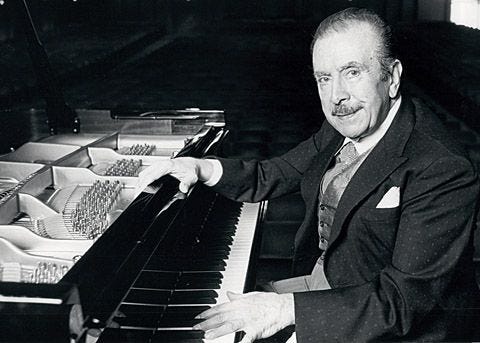
I have already mentioned the great Chilean pianist, Claudio Arrau, in my post about Beethoven’s Piano Sonata №30, Op. 109. While Arrau was considered one of the greatest interpreters of Beethoven, he was also considered one of the greatest interpreters of Chopin, Liszt, Schubert, Brahms, Schumann….his breadth of repertoire was simply astounding!
Claudio Arrau lived a very long life, born in Chillan, Chile in 1903, and passing away in mid-tour in 1991. At the time of his death, he was recording the complete works of Bach, and preparing music by Haydn, Mendelssohn, Reger, Busoni, and Boulez.
In an article celebrating Arrau’s 60th birthday in 1963, the author writes, “it has been estimated that Arrau’s total repertoire would carry him through 76 recital evenings, not counting the 60-odd works with orchestra which he also knows.”
For most of his 88 years, he was in the public eye. At the age of four he gave his first public recital and at the age of six played for the president of Chile, Pedro Montt, who immediately afterwards began planning Arrau’s future education. A special ten-year-long grant was created for Arrau by the Chilean government for Arrau to study in Germany, and at the age of 8, with his mother and older sister accompanying him, he began his studies at the Stern Conservatory, studying with the famous piano pedagogue and student of Franz Liszt, Martin Krause. Here is Chopin’s Waltz opus 34 no. 3 from his first acoustic recordings, made in 1921.
Arrau’s first recording to achieve international fame was his 1942 recording of Bach’s Goldberg Variations.
In 1960 Arrau recorded, with the wonderfully insightful conductor Carlo Maria Giulini, both of the Brahms piano concertos. They remain one of the greatest examples of two towering artists working together to achieve a and unforgettable recording.
For many, myself included, his second recording of the Chopin Preludes, Op. 28, have never been surpassed. It is hard to understand how pianist, considering the instrument, can have such a unique sound, yet I have never been able to hear another recording of this piece — and, don’t get me wrong, I love other recordings of the Preludes — during which I’m not imagining how Arrau plays it.
The same can be said for his recording of the complete Chopin Nocturnes, although I equally love Rubinstein’s recordings, as well.
Arrau was known as the “emperor” of pianists and his signature concerto was, appropriately, Beethoven’s Piano Concerto №5 “Emperor.” He recorded it many times, but I thought I’d share this wonderful video with Sir Colin Davis conducting the London Symphony Orchestra.
His first complete recording of Beethoven’s piano sonatas are considered a reference.
But in researching for this article, I’ve discovered so many incredible live performances on YouTube. Here are just a few that are so worth watching.
Finally, I’ll end with two revealing documentaries, one just six-minutes in length but containing great interviews, the other an hour-long documentary focusing on his historic return to Chile in 1984.
